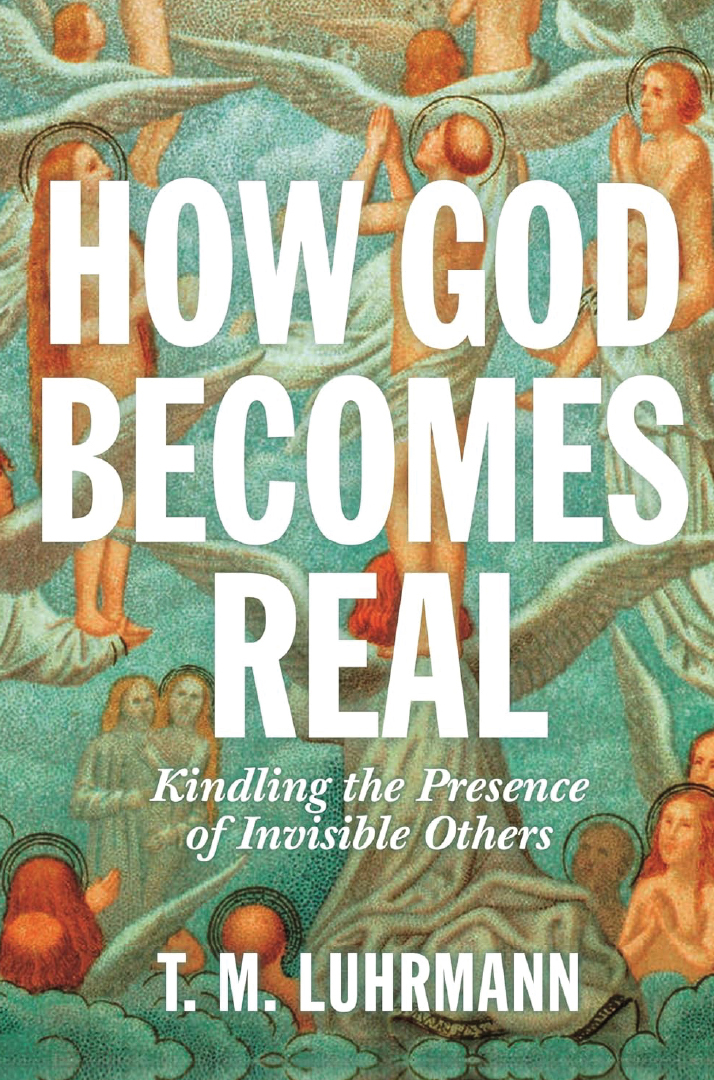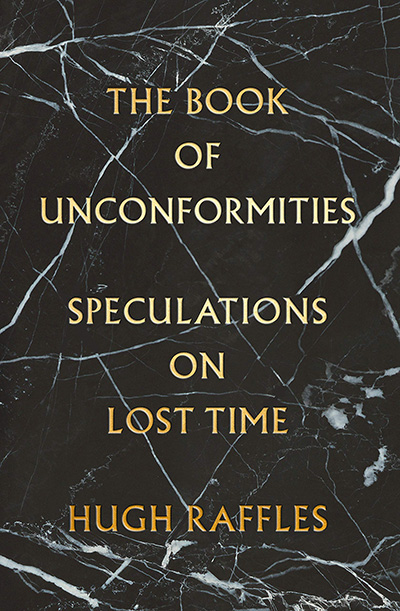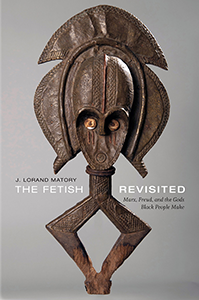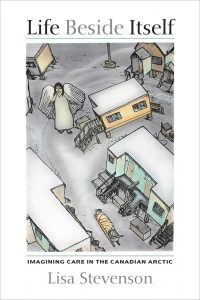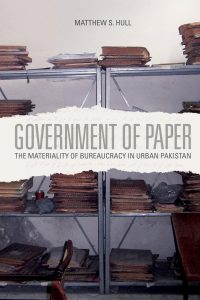The School for Advanced Research (SAR) presents the J. I. Staley Prize to a living author for a book that exemplifies outstanding scholarship and writing in anthropology. The award recognizes innovative works that go beyond traditional frontiers and dominant schools of thought in anthropology and add new dimensions to our understanding of the human species. It honors books that cross subdisciplinary boundaries within anthropology and reach out in new and expanded interdisciplinary directions.
By recognizing groundbreaking books and their authors through the J. I. Staley Prize, SAR seeks to stimulate the best in anthropological research and writing. Authors other than anthropologists are eligible to receive the Prize if their work has had a significant impact on scholars and practitioners in the field of anthropology.
The J. I. Staley Prize carries a cash award of $7,500.
Please note that books must be published in English.
Nominations
Instructions for nominating a book for the J. I. Staley Prize can be found here.
For further information, call the J. I. Staley Prize coordinator at (505) 954-7237 or e-mail staley@sarsf.org.
2024 Staley Prize Winner: T. M. Luhrmann, How God Becomes Real: Kindling the Presence of Invisible Others
How God Becomes Real: Kindling the Presence of Invisible Others
T. M. Luhrmann
Based on decades of wide-ranging fieldwork with evangelical Christians in the U.S., India, and elsewhere, as well as other denominational communities, Luhrmann argues that it is action, discipline, and repetition that drive faith, rather than the reverse.
— 2024 J. I. Staley Prize Committee
Tanya Marie Luhrmann is the Albert Ray Lang Professor of Anthropology at Stanford University, with a courtesy appointment in Psychology.
2023 Staley Prize Winner: Hugh Raffles, The Book of Unconformities: Speculations on Lost Time
The Book of Unconformities: Speculations on Lost Time
By Hugh Raffles
In this startlingly original book, Hugh Raffles explores the relationship of human and geologic time through the fundamental materiality of stone. He effortlessly blends geology, archaeology, history, ethnography, and travel to broaden our notions of what anthropology can be, radically crossing disciplinary boundaries. The narrative ranges from personal grief to plate tectonics, with a close reading of the headlong exploitation of our natural world. The sharp black-and-white images throughout the book add texture to Raffles’ stories by serving as visual counterpoint to his analysis.
The central metaphor of the work, the unconformity, is deployed both in its scientific sense—as a break of time in the geological record, typically caused by rupture and erosion—and in the tendency of humans to act as erosive agents through our tireless reshaping of the world and extraction of the planet’s mineral resources. These unconformities play out on multiple levels: geological strata overlapping and colliding, historical conflicts and erasures between different peoples, and most tellingly, between humans and the natural world they seek to exploit and tame. The “speculations on lost time” are the deep time of geology, the historical time of exploration and exploitation that have shaped today’s damaged world, and also the time spent with loved ones who remain only in memory.
— 2023 J. I. Staley Prize Committee
Hugh Raffles is Professor and Chair of Anthropology at The New School for Social Research and Director of the Graduate Institute for Design, Ethnography and Social Thought.
2022 Staley Prize Winner: J. Lorand Matory, The Fetish Revisited: Marx, Freud, and the Gods Black People Make
The Fetish Revisited: Marx, Freud, and the Gods Black People Make
By J. Lorand Matory
In a work of considerable ambition and insight, J. Lorand Matory challenges the traditional Eurocentric view of the “fetish” by showing how it is not only a distorted concept but an implicit accusation that peoples who believe in the power of symbolic objects are irrational and unsophisticated. In so doing, Matory reveals the profound limitations of the canonical ideas of “fetishism” propounded by Karl Marx and Sigmund Freud. Through close ethnographic engagement with Afro-Atlantic thinkers and religious practitioners, Matory reveals them to be as perceptive as any European theorist. Indeed, he argues, so- called “fetishists” have a great deal to teach us about their complex spiritual practices and nuanced understanding of the world. The Fetish Revisited is likely to prove influential in fields far beyond anthropology, including philosophy, psychology, and religious studies.
— 2022 J. I. Staley Prize Committee
J. Lorand Matory is the Lawrence Richardson Professor of Cultural Anthropology and the Director of the Sacred Arts of the Black Atlantic Project at Duke University
2021 Staley Prize Winner: Laurence Ralph, Renegade Dreams, Living Through Injury in Gangland Chicago
Renegade Dreams, Living Through Injury in Gangland Chicago
by Laurence Ralph
Following the lives of current and former gang members, community and church leaders, and grandmothers in a west Chicago neighborhood, Laurence Ralph’s Renegade Dreams launches a new generation of urban ethnography. Its brilliance lies in his ability to show how “Eastwood” is much more intimately connected to broader political, economic, and moral landscapes than popular narratives of the “inner city” lead us to believe. Through rich ethnographic descriptions of multilayered characters, Ralph succeeds in presenting each as a holistic human being navigating broader processes—of gang violence, HIV, and drugs, but also of economic inequality and gentrification—that lead to what he theorizes as injury. Using this nuanced concept of injury—physical, psychological, economic, moral—Ralph clearly demonstrates that while each person’s agency may be in various ways transformed through structural violence, it is precisely those sites of trauma where people’s shifting dreams and aspirations emerge. – 2021 J. I. Staley Prize Committee
Laurence Ralph is Professor of Anthropology at the Princeton University.
2020 Staley Prize Winner: Lisa Stevenson, Life Beside Itself Imagining Care in the Canadian Arctic
Life Beside Itself Imagining Care in the Canadian Arctic
by Lisa Stevenson
Lisa Stevenson’s Life Beside Itself examines two historical moments among the Inuit of northern Canada: a tuberculosis epidemic in the mid-twentieth century and an epidemic of suicides among Inuit youth today. Stevenson demonstrates how the Canadian state’s approach to care is in both cases shaped by a biomedical model inattentive to the realities of Inuit life in a settler colonial context. Although well-meaning and carried out by dedicated professionals, conventional biomedical care that seeks to extend life at all costs ignores the kind of life being preserved. Through richly textured analysis, she shows how suicide prevention programs disregard what makes life worthwhile to Inuit people. Stevenson’s evocative prose takes risks, asking readers to dwell alongside the author as she slowly reveals how to listen differently to her interlocutors. Life Beside Itself deftly weaves together ethnography, archival voice recordings, and images to raise new questions about life, death, and care. – 2020 J.I. Staley Prize Committee
Lisa Stevenson is Associate Professor of Anthropology at the McGill University.
2019 Staley Prize Winner: Matthew Hull, Government of Paper
Government of Paper: The Materiality of Bureaucracy in Urban Pakistan
by Matthew Hull
“Cities are shaped as much by paper and rubber stamps as they are by bricks and mortar, argues Matthew Hull in Government of Paper. By tracing the unexpected ways in which documents travel, he exposes the secret life of paper that profoundly shapes the built landscape of the planned city of Islamabad, and more broadly, gives us new ways of understanding bureaucracy on a global scale.
Taking us behind the bureaucrat’s desk, and examining the slippage between traditional and modern systems of measurement, the book shows how officials delegate agency and shape petitioners’ lived environments through circulating or sometimes misplaced documents. These are the material traces of bureaucratic processes which diffuse responsibility and yet influence the ownership of property, housing, religious worship, and commerce. Developing the notion of “graphic artifacts,” Hull challenges our conventional notions of administrative process: more than inert forms, papers tell stories, make new meanings, and produce relationships under the guise of imposing rationality on the disorder of a complex city.” – 2019 J.I. Staley Prize Committee
Matthew S. Hull is Associate Professor of Anthropology at the University of Michigan.
2018 Staley Prize Winner: Jason De León, Land of Open Graves
The Land of Open Graves: Living and Dying on the Migrant Trail
by Jason De León
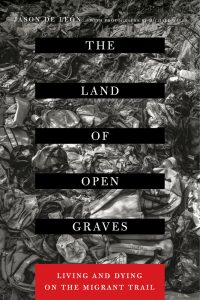
The Land of Open Graves by Jason De Leon
The Land of Open Graves reveals the suffering and deaths that occur daily in the Sonoran Desert of Arizona as thousands of undocumented migrants attempt to cross the border from Mexico into the United States. De León uses an innovative combination of ethnography, archaeology, linguistics, and forensic science to produce a critique of “Prevention through Deterrence,” the federal border enforcement policy that funnels migrants to areas characterized by extreme environmental conditions and high risk of death turning the rugged terrain of southern Arizona into a killing field. In harrowing detail, De León chronicles the journeys of people who have made dozens of attempts to cross the border and uncovers the stories of the objects and bodies left behind in the desert.
“Through an examination of the experience of undocumented migrants moving across the U.S.-Mexican border, Jason De León’s The Land of Open Graves integrates archaeological and ethnographic techniques to expose a central tragedy of border-protection policies that turn the harsh Sonoran desert environment into a zone of death. His prose, by turns clinical and intimate, draws readers into a politicized landscape and offers the vivid testimony of people who have survived their desert crossing. Using forensic techniques and the photographs of Michael Wells and others, De León also reconstructs the stories of those who perished, in the process inventing an experimental archaeology of the present. A powerful work of witnessing, The Land of Open Graves has profound relevance in an era of vast social displacement and global migration.” – 2018 J.I. Staley Prize Committee
Jason De León is an Associate Professor in the Anthropology Department at the University of Michigan and a 2017 MacArthur Fellow. He is also a 2013-2014 SAR Resident Scholar.
2017 Staley Prize Winner: Stefan Helmreich, Alien Ocean
Alien Ocean: Anthropological Voyages in Microbial Seas
by Stefan Helmreich
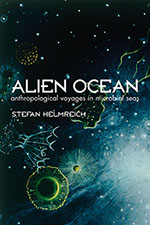
Alien Ocean, by Stefan Helmreich. 2009, University of California Press
The winner of this year’s prestigious J.I. Staley Prize is Dr. Stefan Helmreich for his book Alien Ocean: Anthropological Voyages in Microbial Seas. Working alongside marine biologists in the water and in labs in Monterey Bay, Hawai’i, the Woods Hole Oceanographic Institution, the Sargasso Sea, and at undersea volcanoes in the eastern Pacific, Dr. Helmreich explores how the use of new technologies such as molecular biological techniques, gene sequencing, bioinformatics, and remote sensing have changed the way scientists study the Earth’s oceans and seas. “These scientists,” writes Dr. Helmreich in his introduction, “are learning to see the sea not only as the home medium for marine mammals, fishes, and seaweeds, but also as a realm inhabited, maintained, and modulated by an extraordinary mix of microbes, many of which live at astonishing extremes of light, temperature, pressure, and chemistry.” So unusual and unfamiliar are many of the microbes and their significance to the web of life that the word alien seems the best descriptive – to humans, no less mystifying than deep space and the life that may or may not exist in it.
The Staley Prize committee cites their reasons for choosing Alien Ocean as the winner of the 2017 J.I. Staley Prize:
Stefan Helmreich’s pioneering account of marine life and the people who study it takes readers on a journey from microbial DNA to oceanic and, ultimately, interstellar space. The vastness of the ocean emerges as both field site and object of study, which he renders, in lyrical and sometimes playful prose. Through a close analysis of the ocean’s oscillation between legibility and radical unknowability, Helmreich shows that in the twenty-first century microrganisms have become the primary focus of scientific knowledge production and resource extraction. He considers how new biotechnologies dissolve the interface between the human and non-human, thus disrupting the nature/culture binary and our understanding of life itself.
Stefan Helmreich is the Elting E. Morison Professor of Anthropology at the Massachusetts Institute of Technology and the author of Sounding the Limits of Life: Essays in the Anthropology of Biology and Beyond (Princeton University Press, 2016).
2016 Staley Prize Winner: S. Lochlann Jain, Malignant
Malignant: How Cancer Becomes Us
by S. Lochlann Jain
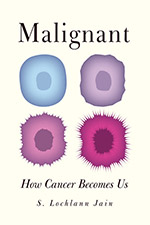
Malignant, by S. Lochlann Jain. 2013, University of California Press
The winner of this year’s prestigious J.I. Staley Prize is Dr. S. Lochlann Jain for her book Malignant: How Cancer Becomes Us. Pulling together vast amounts of cultural analysis across a range of material that includes history, oncology, law, economics, and literature, Dr. Jain explores why the “War on Cancer” remains unsuccessful. The reams of information, studies and data, added to a society that at once attempts to cure cancer as well as to make it profitable, create a virtually impossible to navigate cultural narrative. Malignant offers a brilliantly researched guide to untangling this web of uncertainty.
The Staley Prize committee explains the reasons why Malignant: How Cancer Becomes Us stood out amongst the nominations for the 2016 award:
S. Lochlann Jain is Associate Professor in the Department of Anthropology at Stanford University and author of Injury: The Politics of Product Design and Safety Law in the United States. Her research is primarily concerned with the ways in which stories get told about injuries and in exploring the political and social significance of these stories.
2015 Staley Prize Winner: William F. Hanks, Converting Words
Converting Words: Maya in the Age of the Cross
by William F. Hanks
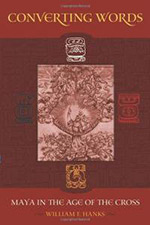
Converting Words by William F. Hanks. 2010, University of California Press
The winner of this year’s prestigious J.I. Staley Prize is Dr. William F. Hanks for his book Converting Words: Maya in the Age of the Cross. This pathbreaking synthesis gives an unprecedented view of the first two hundred years of the Spanish colonization of the Yucatec Maya. Drawing on an extraordinary range and depth of sources, Dr. Hanks documents for the first time the crucial role language played in this cultural conquest. He explores how colonial Maya emerged in the age of the cross, how it was taken up by native writers to become the language of indigenous literature, and how it ultimately became the language of rebellion against the system that produced it. Converting Words includes original analyses of the linguistic practices of both missionaries and Maya found in bilingual dictionaries, grammars, catechisms, land documents, native chronicles, petitions, and the forbidden Maya Books of Chilam Balam.
The Staley Prize Committee writes:
Dr. William F. Hanks is Professor of Anthropology, Berkeley Distinguished Chair in Linguistic Anthropology, and Affiliated Professor of Linguistics at the University of California, Berkeley. Concurrently, at the University of Texas at Austin, he is Professor of Anthropology and of Linguistics and the C.B. Smith Sr. Centennial chair in US–Mexico Relations. His books include Language and Communicative Practices and Referential Practice: Language and Lived Space among the Maya.
“This work is utterly original and unprecedented. I don’t think historians of the Mesoamerican colonial regimes should write anything until they read this book; it’s that important.”
— Jane H. Hill, author of A Grammar of Cupeño
2014 Staley Prize Winner: Joseph Masco, The Nuclear Borderlands
The Nuclear Borderlands: The Manhattan Project in Post-Cold War New Mexico
by Joseph Masco
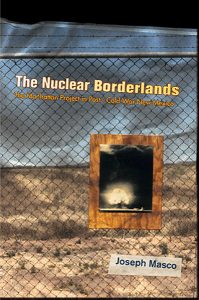
The Nuclear Borderlands: The Manhattan Project in Post-Cold War New Mexico, by Joseph Masco. 2006, Princeton University Press
Update: On December 5, 2014, Joseph Masco was honored with a presentation ceremony and reception at the American Anthropological Association annual meeting for his book The Nuclear Borderlands: The Manhattan Project in Post-Cold War New Mexico. Corinne A. Kratz, who nominated the book, gave a speech at the reception in which she said, “Joe’s book blew me away.” The full text of Kratz’s speech is included below.
2014 Staley Prize Awarded to Dr. Joseph Masco
The winner of this year’s prestigious J. I. Staley prize is Dr. Joseph Masco for The Nuclear Borderlands: The Manhattan Project in Post-Cold War New Mexico. The book is an exploration of our national amnesia about the dawn of the nuclear age and its institutionalization. Situated in Los Alamos, NM, Masco’s ethnography portrays five communities—Puebloan, Nuevomexicano, and Anglo residents, as well as nuclear scientists and anti-nuclear activists—that have not forgotten. Masco examines the secretive nuclear enterprise, the communities most intimately involved with it, and their mutually constitutive interactions. It brings together a vast array of information about the nuclear industry, including the hazards of plutonium, the seduction of technoaesthetics, and the recent medicalization of aging bombs. Masco highlights people’s voices, selecting particularly eloquent phrases to explore the realities, meanings, and motivations behind them. Through these voices he creates an epic narrative, giving us a new vocabulary—mutant ecologies, nuclear uncanny, and nuclear sublime. Masco raises troubling questions about the way the nuclear age has redefined modern life and nation states, and the immense risks of forgetting.
Excerpted from The Nuclear Borderlands:
Looking back across the temporal surface of the Cold War, the purple fireball and glassified green earth created in the deserts of New Mexico at exactly 5:29:45 a.m. on July 16, 1945, can only be narrated as a moment of historical rupture and transformation. For the detonation of the first atomic bomb marked the end of one kind of time, and the apotheosis of another, an uncanny modernity that continually exceeds the language of “national security,” “mutual assured destruction,” the “Cold War,” or even “terror.” For this reason alone, we might profitably return to the northern Rio Grande to assess the legacy and implications of one of the twentieth century’s most enigmatic, yet lasting, achievements.
Dr. Joseph Masco is a professor of anthropology and of the social sciences at the University of Chicago. He writes and teaches courses on science and technology, US national security culture, political ecology, mass media, and critical theory. His book, The Nuclear Borderlands, also received the Rachel Carson Prize from the Society for the Social Studies of Science and the Robert K. Merton Prize from the Section on Science, Knowledge and Technology of the American Sociology Association. He is a contributor to the book Bioinsecurity and Vulnerability, which was released in the fall of 2014 by SAR Press.
Corinne A. Kratz gave the following speech at the Staley Prize reception held for Joseph Masco on December 5, 2014, at the American Anthropological Association annual meeting.
When I nominated Joe’s book, The Nuclear Borderlands: The Manhattan Project in Post-Cold War New Mexico for the Staley Prize, I began the nomination letter by saying:
Nuclear Borderlands is a masterful and nuanced account of far-reaching cultural and political economic transformations that emerged from the Manhattan Project and the broader nuclear state project centered at Los Alamos National Laboratory (LANL). Tracing the shifting social engagements, experiences and meanings of LANL’s work and presence from the 1940s through the early 2000s, Masco examines how they have become embedded in the lives of communities working in and neighboring LANL, as well as in national imaginaries and institutions and in global relations and futures. Nuclear Borderlands is a book about changes wrought in “our concepts of nature, security, power, and citizenship, as well as the terms of everyday life,” about what he calls a “multigenerational biosocial experiment” (p. 337). The results and implications touch every being on the planet.
In other words, Joe’s book blew me away. Joe and I were resident scholars together at SAR in 2004-2005. That’s when I really began to notice his work – as it also began appearing in American Ethnologist, Cultural Anthropology, Public Culture, Radical History Review, and became a steady torrent of articles in journals and books. Nuclear Borderlands was in press that first time we were in Santa Fe together, so I followed the issues with production, illustrations, and so on and was able to get Joe to write a short piece for an edited book I was just finishing, Museum Frictions. So when Nuclear Borderlands appeared, I was eager to read it. As I said, it blew me away.
The first part, “Everyday Life in the Plutonium Economy,” is a quartet of chapters written from the perspectives of different groups in New Mexico involved with LANL: scientists doing nuclear research, neighboring Pueblo and Nuevomexicano communities, and anti-nuclear activists in Santa Fe. We get a kind of prism that creates a detailed historical and ethnographic sense of the daily experiences and contradictions of these multiple engagements. Joe analyzes conflicts and convergences in worldviews, different relations to and understandings of nature and land, different secrecy regimes and notions of security, diverse institutional effects and divergent, intersecting stakes in LANL and its work.
The final section, “National Insecurities,” shows how insecurities and uncertainties have become embedded in national and local life as part of what Joe calls the nuclear uncanny and radioactive nation building. Two key events are his starting points. Accusations of spying and insecurity in 1999 that included the Wen Ho Lee case illuminate the structures and workings of secrecy, knowledge, racialized nuclear risk, and the security state. Then he turns to the Cerro Grande forest fire of 2000, which burned thousands of acres and destroyed hundreds of homes. It also released fears of nuclear apocalypse through which Joe traces the “mutant ecologies” that have redefined American understandings of nature, health, and contamination, from the giant mutant ants of the film Them (1954) to the sentinel honeybees and secret tissue collection projects through which LANL tracked the ecological and human consequences of radiation exposure.
I wanted to describe the book to give you a sense of why and how it blew me away. It’s multifaceted community ethnography and regional analysis with acute attention to broad state organizations, deftly showing how local, regional, and global processes interconnect. It takes science studies out of the laboratory, even as it maintains attention to changing social and cultural processes involved in the lab’s scientific work and meanings. It’s full of astute — and sometimes alarming — analyses that integrate telling details with sweeping scope and implications. Every chapter has narratives and commentaries from people in northern New Mexico that might be simultaneously touching, dramatic, or horrifying—ranging from such intimate bodily experiences as flashblindness or an accidental dousing in radioactive toxins that means leaving one’s underwear at work, to social processes that render events “unthinkable,” to barely imaginable futures when the effects of the nuclear project will still be unfolding, redefining worlds and how people think, recasting notions of nation and citizenship, border and risk, space and time. Joe maintains a clear-eyed view of the political stakes at each scale as well as the changing aesthetic/intellectual appeal that the nuclear project has held for scientists over time.
Nuclear Borderlands is beautifully written and meticulously researched. Joe artfully integrates historical and archival sources, interviews, press reports, film, museum exhibits, accounts of meetings and rallies he attended, and participant observation’s accounts and detail of daily life across diverse settings and experiences. Exegeses of key passages from documents, commentaries, and interviews zero in on striking and revelatory vocabulary, phrases and sentences to elaborate their assumptions, logics, and entailments. Joe brings to bear concepts and approaches from classic and contemporary critical theory—from Mauss, Freud, Simmel, Gluckman, Benjamin, and Marx to McClintock, Buck-Morss, Foucault, Escobar, Latour, and Chatterjee. In each case, he gives smart and generous readings of the concepts he borrows or applies, and then deftly redefines and reinvigorates them to illuminate aspects of the nuclear project and its effects and implications.
So that’s why Joe’s book blew me away. It’s a fresh, imaginative, and insightful work that combines profound intelligence and theoretical rigor with clear, graceful writing and elan, consistently attentive to the human dramas, concerns, and dilemmas that have defined the nuclear borderlands. It sets a standard for interdisciplinary work even as it upholds the best standards of ethnographic research and analysis. It illuminates a half century of transformations that have come out of the Manhattan Project and offers a glimpse of what might be in store for all of us and for the planet for millenia to come. Joe continued work on his larger project on the security state — his next book has just appeared from Duke University Press — The Theater of Operations: National Security Affect From the Cold War to the War on Terror — two others are near completion, and he has begun framing his next project. So we are likely to see him back again at award ceremonies in the near future.
Congratulations, Joe.
“The Nuclear Borderlands alters the meaning of ‘ethnography’ in a way that will challenge all of us in anthropology. It will certainly take its place among the classic texts assessing the cultural politics of the bomb, and it will join the must-read ranks in the literature on American nationalism and nation-making in the late twentieth century.”
—Susan Harding, University of California, Santa Cruz, author of The Book of Jerry Falwell and Remaking Ibieca
“No account of the post-Cold War environment can afford to ignore this study and the tangle of economic, political, and cultural rights, interests, and imperatives it maps. Joe Masco pushes the ethnographic agenda firmly forward into an ambivalent twenty-first century, where Los Alamos is both dangerous polluter and lifeline employer, where rival eco-cultures, ethnicities, and social hierarchies fight over control of nature, and where the technological future can exacerbate or redeem the nuclear past. Neither antinuclear environmentalists, nor Native Americans, nor Nuevomexicanos, nor the Los Alamos scientists, nor the Washington politicians have a monopoly on the answers, and Masco shows us why.”
—Michael M. J. Fischer, Massachusetts Institute of Technology, author of Emergent Forms of Life and the Anthropological Voice
Joseph Masco, Professor of Anthropology and of the Social Sciences, Department of Anthropology, University of Chicago
2013 Staley Prize Winner: João Biehl, Vita
Vita: Life in a Zone of Social Abandonment
by João Biehl
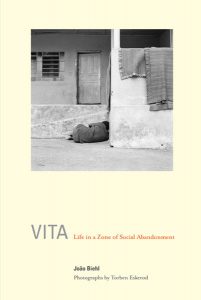
Vita: Life in a Zone of Social Abandonment, by João Biehl. 2005, University of California Press
Each year, SAR presents the $10,000 J. I. Staley Prize to a living author for a book that exemplifies outstanding scholarship and writing in anthropology. The award recognizes innovative works that go beyond traditional frontiers and dominant schools of thought in anthropology and add new dimensions to our understanding of the human species. It honors books that cross subdisciplinary boundaries within anthropology and reach out in new and expanded interdisciplinary directions.
By recognizing groundbreaking books and their authors through the J. I. Staley Prize, SAR seeks to stimulate the best in anthropological research and writing. Authors other than anthropologists are eligible to receive the prize if their work has had a significant impact on scholars and practitioners in the field of anthropology.
This year’s awardee is Dr. João Biehl, Susan Dod Brown Professor of Anthropology, Princeton University, for his book Vita: Life in a Zone of Social Abandonment. Beihl’s first-person account of his years spent at Vita, an asylum in Brazil, opens with a quote from a woman named Catarina, “In my thinking, I see that people forgot me.” Catarina was taken to Vita by her family because they considered her mentally ill, though she actually suffered from a degenerative neurological disorder. At Vita, Catarina began keeping what she called her dictionary. She said she was doing this “to not forget the words.” Biehl tells Catarina’s story, not only in his words, but in her own, with passages from her dictionary that often amount to poetry. Through her story, Biehl has written a revelatory work about a social strata where “the abandoned waited with death.”
The Staley Committee’s citation reads:
“This book is beautifully and powerfully written; it haunts the reader. This is in part accomplished through the collaboration between the ethnographer and an outstanding Danish photographer whose photos stop the reader in his tracks … . The book has had a huge impact in medical anthropology and related subfields.”
—Arthur Kleinman, Professor of Anthropology, Harvard University
João Biehl, Susan Dod Brown Professor of Anthropology, Princeton University
2012 Staley Prize Winner: Sarah Blaffer Hrdy, Mothers and Others
Mothers and Others:The Evolutionary Origins of Mutual Understanding
by Sarah Blaffer Hrdy
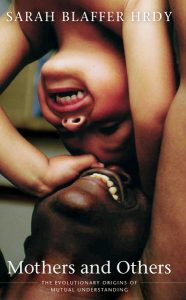
Mothers and Others: The Evolutionary Origins of Mutual Understanding, by Sarah Blaffer Hrdy. 2009, Harvard University Press
Sarah Blaffer Hrdy’s sophisticated and provocative book Mothers and Others: The Evolutionary Origins of Mutual Understanding (Harvard University Press, 2009) lays out a new and carefully argued hypothesis to explain the evolution of our uniquely human need to share views, feelings, and meanings, and to enjoy cooperating with each other. Her transformative analysis marshals paleontology, primatology, ethnology, and evolutionary science to argue for a complex emotional capacity among hominins that evolved well before the emergence of Homo sapiens. The reproductive success of the hominins relied on cooperative parenting and the singular capacity of infants to elicit affective bonds with those who nurtured them. The book casts new light on contemporary understandings of parenting, family, and community and challenges us to question assumptions about the primacy of the Western nuclear family.
The following paragraph from the book launches Hrdy’s theory and the question upon which her research is based: Why us and not them?
“If we really want to raise Darwin’s consciousness we need to expand evolutionary perspectives to include the Darwinian selection pressures on mothers and on infants.”
—Sarah Blaffer Hrdy, Scientific American Blog
In a review of Mothers and Others in the journal Evolutionary Psychology, reproductive ecologist Peter Ellison states, “Hrdy has woven together strands of material from many sources into an elegant tapestry of insight and logic, emblazoned with her vision of who we are, and why.”
Hrdy is currently professor emerita of anthropology at the University of California, Davis. Her books include The Woman That Never Evolved, selected by the New York Times as one of its Notable Books of 1981, and Mother Nature: A History of Mothers, Infants and Natural Selection, which was chosen by both Publisher’s Weekl and Library Journal as one of the “Best Books of 1999” and won the Howells Prize for Outstanding Contribution to Biological Anthropology.
Sarah Blaffer Hrdy, Professor Emerita of Anthropology, University of California, Davis
2011 Staley Prize Winner #1: Katherine Verdery, The Vanishing Hectare
The Vanishing Hectare:Property and Value in Postsocialist Transylvania
by Katherine Verdery
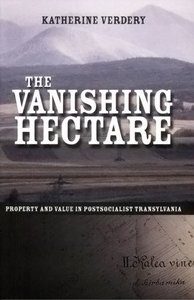
The Vanishing Hectare, by Katherine Verdery. 2003, Cornell University Press
Katherine Verdery’s The Vanishing Hectare encompasses more than a decade of research in the Romanian agricultural village of Aurel Vlaicu. She examines transformations in socialist and post-socialist property regimes, and argues for a socially embedded understanding of the concept of property itself that arcs across both historical themes. Based on long-term fieldwork and masterful synthesis of political economy, ethnography and history, Verdery’s book offers a powerful critique of the economic logic of neo-liberal development schemes, while revealing the dynamics of change and everyday realities for agricultural families in the post-socialist world.
Katherine Verdery, Professor of Anthropology, CUNY Graduate Center
2011 Staley Prize Winner #2: Joel Robbins, Becoming Sinners
Becoming Sinners: Christianity and Moral Torment in a Papua New Guinea Society
by Joel Robbins
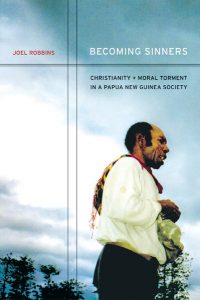
Becoming Sinners: Christianity and Moral Torment in a Papua New Guinea Society, by Joel Robbins. 2006, University of California Press
Joel Robbins’s Becoming Sinners is the story of how the Urapmin, a small Papua New Guinea indigenous community, came to see themselves as “sinners” through the contradictions that followed their wholesale adoption of Christianity while remaining embedded in Urapmin social morality. Confounded by Christian notions of individualism and Urapmin emphasis on kin and community as central to moral life, they attempt to resolve the tensions through “everyday millennialism” that seeks community salvation through individual piety. As such, this ethnographic case study illuminates how global processes of culture change and religious conversion have played out among local peoples around the world.
Joel Robbins, Professor of Anthropology, UC San Diego
2010 Staley Prize Winner: Sally Engle Merry, Human Rights and Gender Violence
Human Rights and Gender Violence: Translating International Law into Local Justice
by Sally Engle Merry
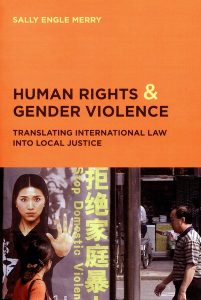
Human Rights and Gender Violence: Translating International Law into Local Justice, by Sally Engle Merry. 2006, University of Chicago Press
This innovative book examines the application of international human rights law addressing gender violence to local cultural contexts. In an ethnography that begins in the negotiating rooms of the UN and extends to five local case studies, Merry ranges from gendered inheritance rights in Hong Kong to conflict resolution practices in Fiji, from “husband-wife cruelty” in India to family violence in Beijing. Drawing on a sophisticated, multi-level analysis, she examines how global human rights discourse is translated from international organizations to local communities and families through the mediation of NGOs. In the process, she challenges the notion that local, traditional culture is an obstacle to the implementation of human rights, and argues for a more complex and dynamic understanding of culture. In so doing, she reclaims “culture” as a workable and usable framework for addressing contemporary global problems. This book is significant not only to anthropologists but to anyone interested in the theory and practice of human rights.
According to Merry, “my goal in writing Human Rights and Gender Violence was to show the value of an anthropological understanding of the way the human rights system actually works. I also hoped to make it more comprehensible to non-experts, particularly given the Bush-era hostility to international law and human rights. In the course of the research, I was surprised to discover how the core anthropological concept of culture was being used and misused within global discourse. I hope this book will help other ethnographers studying the complicated space of local, national, regional, and international institutions and cultural circulation.”
Sally Engle Merry, Professor, Department of Anthropology and the Institute for Law and Society, NYU
2009 Staley Prize Winner: Jonathan Marks, What It Means To Be 98% Chimpanzee
What It Means To Be 98% Chimpanzee: Apes, People, and Their Genes
by Jonathan Marks
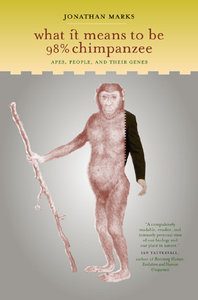
What It Means To Be 98% Chimpanzee, by Jonathan Marks. 2002, University of California Press
The winner of the 2009 J. I. Staley Prize is What It Means To Be 98% Chimpanzee: Apes, People, and Their Genes by Jonathan Marks (University of California Press, 2002). Marks, a professor of anthropology at the University of North Carolina, Charlotte, was recommended for the prize by a distinguished panel of anthropologists, who reviewed a total of 39 nominated books. The J. I. Staley Prize is awarded annually by the School for Advanced Research to a living author in recognition of a book that not only exemplifies outstanding scholarship and writing in anthropology, but also goes beyond the discipline’s traditional frontiers.
In What It Means To Be 98% Chimpanzee, Marks uses the “molecular factoid” that we share 98 percent of our genetic material with chimps as a springboard to survey and critique with razor-sharp humor a range of hot-button issues in molecular anthropology, from the role of science in society to racism, animal rights, and cloning. “This is where genetics and anthropology converge,” Marks writes, “the gray zone of molecular anthropology, which forces us not just to look at the genetic data but to question both the cultural assumptions we bring to those data and their relevance for thinking about the modern world and interpreting our place within it.”
American Scientist calls Marks’s widely acclaimed book “a trenchant assault on genetic reductionism and a spirited call for a more critical science, one better informed by the perspectives of anthropology and the humanities. What It Means To Be 98% Chimpanzee is a novel, intellectually provocative and wittily engaging treatment of a topic now a shibboleth of modern genetics. If it raises questions about scientists’ social responsibility for which there are no easy answers, so much the better. They are important questions, too frequently evaded elsewhere.”
In their award citation, the J. I. Staley Review Panel states:
Jonathan Marks, Professor of Anthropology, University of North Carolina, Charlotte
2008 Staley Prize Winner: Fred R. Myers, Painting Culture
Painting Culture: The Making of an Aboriginal High Art
by Fred R. Myers
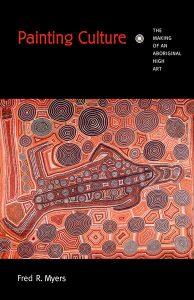
Painting Culture, by Fred R. Myers. 2002, Duke University Press
Fred R. Myers was named winner of the 2008 J. I. Staley Prize for his book, Painting Culture: The Making of an Aboriginal High Art by Fred R. Myers (Duke University Press, 2002). Fred Myers was recommended for the prize by a distinguished panel of anthropologists, who reviewed a total of 43 nominated books. The J. I. Staley is awarded annually by the School for Advanced Research to a living author in honor of a book that exemplifies outstanding scholarship in anthropology.
In their award citation, the J. I. Staley Review Panel stated:
Painting Culture tells the complex story of how, over the past three decades, the acrylic “dot” paintings of central Australia were transformed into objects of international high art, eagerly sought by upscale galleries and collectors. Since the early 1970s, Fred R. Myers has studied the Pintupi, one of several Aboriginal groups who paint the famous acrylic works. Describing their paintings and the complicated cultural issues they raise, Myers looks at how the paintings represent Aboriginal people and their culture and how their heritage is translated into exchangeable values. He tracks the way these paintings have become high art as they move outward from indigenous communities through and among other social institutions—the world of dealers, museums, and critics. At the same time, he shows how this change in the status of acrylic paintings relates to the initiative of the painters themselves and their hopes for greater levels of recognition.
The book has been widely acclaimed by reviewers such as Francoise Dussart, who describes it as “a landmark contribution to the subject of Aboriginal art” (Anthropological Forum, July 2004). In a review appearing in the June 2004 issue of the American Anthropologist, Sally Price writes: “Theoretically, the book is state-of-the-field, engaging frequently with prominent analysts of cultural dynamics… bringing art historical/art considerations into play, and giving serious attention to both the politics and the economics of the art scene(s) he describes.” In conclusion, she states, “Painting Culture makes a monumental contribution to understandings of the cultural, political, and economic dimensions of an increasingly globalized art world.”
red R. Myers, Professor of Anthropology, New York University
2007 Staley Prize Winner: Charles L. Briggs with Clara Mantini-Briggs, Stories in the Time of Cholera
Stories in the Time of Cholera: Racial Profiling During a Medical Nightmare
by Charles L. Briggs with Clara Mantini-Briggs
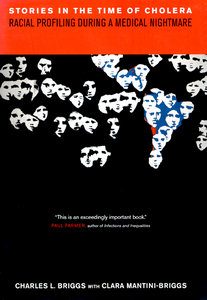
Stories in the Time of Cholera, by Charles L. Briggs with Clara Mantini-Briggs. 2003, University of California Press
A distinguished committee of anthropologists convened by the School for Advanced Research in Santa Fe, NM, recently selected Charles L. Briggs and Clara Mantini-Briggs, authors of Stories in the Time of Cholera: Racial Profiling During a Medical Nightmare (University of California Press, 2002), as winners of the 2007 J. I. Staley Prize for outstanding books in anthropology. In 1992-93, some five hundred people, primarily indigenous “Warao,” died from cholera in the Orinoco Delta of Eastern Venezuela. In some communities, as many as one-third of the adults died in a single night. Briggs and Mantini-Briggs were in the midst of the nightmare, he as an anthropologist with long connections to the indígenas and she as a public health physician attempting to treat the victims of the outbreak.
Cholera is preventable and easily treated. Yet in Venezuela in the 1990s and in 21st century refugee camps, the disease proves unrivaled in the breadth and speed with which it kills. Stories in the Time of Cholera untangles in harrowing detail how inadequate medical services, failures in public health administration, and deeply rooted prejudices against indigenous peoples combined to allow a modern medical tragedy to unfold.
First awarded in 1988, the annual J. I. Staley Prize recognizes innovative books that go beyond traditional frontiers and dominant schools of thought in anthropology to add new dimensions to our understanding of the human species. It is the largest cash prize in the field. Each year SAR convenes an anonymous committee of specialists representing the four subfields of anthropology (socio-cultural, biological, linguistic, and archaeology) to scrutinize and select a winner from among the field of nominated books.
In making the announcement SAR president James F. Brooks quoted the authors’ statement on accepting the award: “We are deeply honored to accept the Staley Prize. In recognizing a book that traces how hundreds of people died unnecessarily more than a decade ago — as much from global indifference as from an easily treatable bacteria — the School for Advanced Research highlights the intellectual and moral challenges when anthropologists are called upon to confront complexity and injustice. SAR’s generosity will extend our alliance with Warao communities in advancing health and human dignity.”
Charles L. Briggs, Professor of Anthropology, University of California, Berkeley
Clara Mantini-Briggs, MD MPH
2006 Staley Prize Winner: Dr. Paul Farmer, Pathologies of Power
Pathologies of Power: Health, Human Rights, and the New War on the Poor
by Dr. Paul Farmer
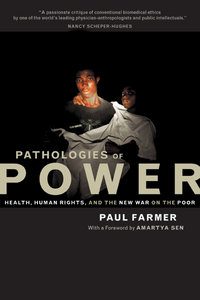
Pathologies of Power, by Dr. Paul Farmer. 2004, University of California Press
A distinguished committee of anthropologists convened by the School for Advanced Research recently selected Dr. Paul Farmer’s Pathologies of Power: Health, Human Rights, and the New War on the Poor (University of California Press) as winner of the 2006 J. I. Staley Prize for outstanding book in anthropology. Described by one reviewer as “superb physician, a penetrating anthropologist, and a prophet of social justice,” Dr. Farmer is The Maude and Lillian Presley Professor of Social Medicine at Harvard Medical School. He will receive the $10,000 Staley Prize on March 29, 2007 at a special ceremony hosted by SAR at the annual meeting of the Society for Applied Anthropology in Tampa, Florida.
Passionate and principled in his claim that health care is a fundamental human right, Dr. Farmer draws upon 20 years of front-line clinical experience among the poorest social outcasts in Haiti, Peru, Boston, and Russia to shake readers from complacency and mobilize them to action. Farmer identifies poverty and illness as a spiral of human degradation that can only be arrested by concerted acts of individual and social conscience. As a medical doctor Farmer is able to comprehend human suffering; as an anthropologist he brings its social and economic roots urgently alive for the reader.
In making the announcement SAR president James F. Brooks commented, “Dr. Farmer’s work in social medicine has drawn acclaim for many years. His contributions to human well-being as an anthropologist are less well known. With this award Dr. Farmer’s extraordinary ability to link medicine and social science in the quest for human dignity receive full acknowledgment.”
Dr. Paul Farmer, Maude and Lillian Presley Professor of Social Medicine, Department of Social Medicine, Harvard Medical School and founding director of Partners in Health
2005 Staley Prize Winner: Terrence W. Deacon, The Symbolic Species
The Symbolic Species: The Co-evolution of Language and the Brain
by Terrence W. Deacon
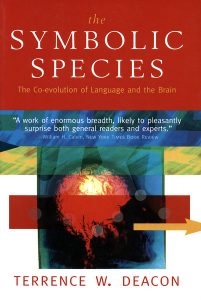
The Symbolic Species, by Terrence W. Deacon. 1997, London and New York: W. W. Norton
A neurologist and anthropologist with a Ph.D. from Harvard, Terrence Deacon was stumped by a question from an eight-year-old in his son’s elementary school class: “If animals can’t learn languages like ours because they’re too complex, why don’t they have simple languages?” He sought the answer by investigating the evolution of human cognition, and the result of his quest, The Symbolic Species: The Co-evolution of Language and the Brain (London and New York: W.W. Norton, 1997) is the recipient of the 2005 J. I. Staley Prize, presented annually by the School for Advanced Research for outstanding scholarship and writing in anthropology.
Deacon’s book blends anthropology with neurobiology, linguistics, and philosophy as it examines the evolution of language. A professor of biological anthropology at the University of California, Berkeley, Deacon argues that language changed the environment in which brains evolved and that many modern human traits were actually caused by ideas. As reviewer Desmond Fearnley-Sander observed in The Human Nature Review, “It is not the ability to communicate that distinguishes us … It is communication of a particular kind: no other species makes promises or poems.”
In “Language,” the author looks at why symbols are distinctive; in “Brain,” he asks how human brains handle symbols and why animal brains can’t do the same. Finally, in “Co-evolution,” Deacon discusses how brains co-evolved with language. His occasionally iconoclastic approach cites Noam Chomsky’s theory of innate universal grammar and theorizes that language evolved in the first place as a way to deal with changing social and sexual organization of hominid groups—language, he suggests, acted as the glue that kept these dynamics stable.
The Staley review panelists found the book “groundbreaking,” “original,” “liberating,” and a “tour de force.” This compelling and highly regarded theory of language development stands as a noteworthy addition to SAR’s Staley Prize recipients.
Terrence W. Deacon, Professor of Biological Anthropology, University of California, Berkeley
2004 Staley Prize Winner: Sherry B. Ortner, Life and Death on Mount Everest
Life and Death on Mount Everest: Sherpas and Himalayan Mountaineering
by Sherry B. Ortner
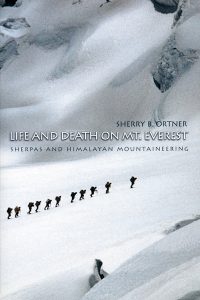
Life and Death on Mount Everest, by Sherry B. Ortner. 1999, Princeton University Press
A compelling study of the relationship between mostly Western mountain climbers—the “sahibs”—and the essential guides, or “Sherpas” in Nepal is the subject of the 2004 J. I. Staley Prize winner,Life and Death on Mount Everest: Sherpas and Himalayan Mountaineering, by Sherry B. Ortner (Princeton University Press, 1999). The Staley Prize is presented annually by the School for Advanced Research to a living author in honor of a book exemplifying outstanding scholarship in anthropology.
Members of this small, mostly Buddhist ethnic group living in the high valleys of Nepal have long been employed as porters and guides, and more recently as expedition members. Because the Sherpas physiologically deal with altitude better than others, Everest legend George Mallory noted after his 1922 expedition that their strength and endurance exceeded all expectations. These silent partners to international mountaineers have carried supplies, established routes, fixed ropes, cooked, and set up camps, Ortner says. They have also saved climbers’ lives and sometimes they have died in the process. “Who were these Sherpas?” she asks. “What did they think they were doing on the stunning and lethal walls of the tallest mountain on earth?”
In single-themed chapters (“Sahibs,” “Monks,” “Death”), Ortner tracks the interplay of influences on the Sherpas, including the rise of international mountaineering, the religious aftermath of the establishment of Buddhist monasteries, and social transformations in their home community, as well as the effects of commercialization on the Sherpa culture. Ortner also looks at the role of gender in the clash of local and foreign masculinities and in the introduction of women mountaineers and Sherpas.
A professor of anthropology at Columbia University and an authority on Sherpa Buddhism, Ortner frames the story as “a cultural ‘encounter’ that leaves neither party unchanged,” wrote Alison Demos in Lingua Franca. Reviewed not only by the academic and popular press but also by special-interest periodicals such as Explorers Journal and New Scientist, Ortner’s book appeals to a broad readership. “It’s written so clearly and with such evident fascination with the subject that it’s more than just accessible to lay readers,” wrote Michael Parfit in the New York Times, “it’s captivating. I’ve had anthropology texts put me to sleep right after morning coffee, but this one kept me awake at night.”
In Life and Death on Mount Everest: Sherpas and Himalayan Mountaineering, Ortner notes that “Sherpas and international mountaineers have competed with and teased one another within a (would-be) shared masculinity, have entered into father-son-like relations, and have occasionally managed to become something like equals and friends. The story of Himalayan mountaineering ‘from the Sherpa point of view’ is the story of these complex and changing relations.”
Sherry B. Ortner, Distinguished Professor of Anthropology, University of California, Los Angeles
2003 Staley Prize Winner #1: Rayna Rapp, Testing Women, Testing the Fetus
Testing Women, Testing the Fetus: The Social Impact of Amniocentesis in America
by Sherry B. Ortner
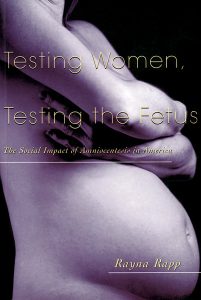
Testing Women, Testing the Fetus, by Rayna Rapp. 1999, Routledge
In 1983, cultural anthropologist Rayna Rapp set out to map the terrain of the emerging technology of amniocentesis, a prenatal diagnostic test used to screen fetuses for chromosomal anomalies and other problems. Over the course of fifteen years, she studied the primary constituencies involved with this new reproductive technology: geneticists, genetic counselors, lab technicians, pregnant women and their supporters who used or refused the test, women who ended their pregnancies following a positive diagnosis, and parents of children with prenatally diagnosable disabilities. Her book, Testing Women, Testing the Fetus, offers “invaluable insights” into the first generation of women-described by Rapp as moral pioneers-who had to decide whether or not to terminate their pregnancies on the basis of amniocentesis results. Prenatal diagnosis, Rapp writes, “forces each woman to act as a moral philosopher of the limits, adjudicating the standards guarding entry into the human community.”
Throughout the book, Rapp remains cognizant of race/ethnicity, class, religion, immigration status, and other social factors that affect access to reproductive technology and that influence women’s decisions. “This ethnography does what so much research about reproductive technologies fails to do—it shows clearly that decision making about the termination of pregnancy is a social act and not merely an individual decision,” observed one nominator.
Rapp’s “strong voice and intrepid analysis” center on three arguments. First, the practice of amniocentesis is consistent with the stratification of reproduction along social fault lines. Second, Americans use scientific knowledge in ways that reinforce stratification based on class, religion, ethnicity, education, and language. And third, society needs to foster better communication between the realm of genetic testing and that of disability rights. Lynn Morgan, reviewing the book for Medical Anthropology Quarterly, called Rapp “one of the most eloquent feminist anthropologists writing today,” and Testing Women, Testing the Fetus, a “tour de force.”
“One of the most pressing problems for anthropologists today is to come to grips with what our roles might be in contributing to commentary on the development, implementation, and assessment of new technologies of all kinds, such as genetically modified foods, organ transplants, and germ-line engineering, all of which will have far-reaching societal effects,” said a nominator. “Rapp’s book must already be counted as a classic in this challenge for future anthropological investigations.”
Rayna Rapp, Professor of Anthropology, Department of Anthropology, New York University
2003 Staley Prize Winner #2: Lawrence Cohen, No Aging in India
No Aging in India: Alzheimer’s, the Bad Family, and Other Modern Things
by Lawrence Cohen
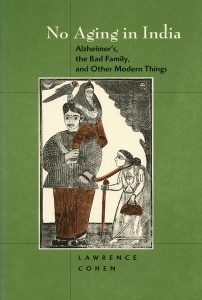
No Aging in India, by Lawrence Cohen. 1998, University of California Press
As a medical anthropologist, Lawrence Cohen writes about age and “its appearance and disappearance in the making of knowledge.” An examination of senility and the radically divergent narratives surrounding it in North America and India are at the core of No Aging in India: Alzheimer’s, the Bad Family, and Other Modern Things, a book Cohen describes as “rooted in a sense that our practices of thinking about society, culture, the body, and the nature of our times would benefit from a sustained attention to age as a kind of difference.”
Cohen studied geriatric and gerontological practice in the United States as a medical student before moving his research to India, where he found no diagnostic counterpart to the North American preoccupation with what has been labeled Alzheimer’s disease. Instead, emerging problems with the elderly were framed in “postcolonial worries about the modern breakdown of the traditional joint family as the socio-moral cause of demented behavior in old people.” Senility, according to this logic, occurs only when younger family members have failed to properly care for their elders.
“Without denying the usefulness of Alzheimer’s as an explanation for a certain set of behaviors,” said an Anthropological Quarterly reviewer, “Cohen challenges us to rethink the medicalization of old age that takes place when we reduce all of the social, political, and existential complexities of aging to the plaques and tangles of a biological brain disease.” Reviewing for Choice, S. A. Tyler wrote, “This intriguing book attempts to resolve the oppositions between medically and culturally defined aging.”
Hailed as “beautifully written and analytically sophisticated, “No Aging in India draws from a panoply of sources: Western tabloid representations of Alzheimer’s, international gerontology conferences, medical texts from the U.S. and India, ancient Indian epics, contemporary Hindi novels, and advertisements for Ayurvedic old age tonics. In addition, Cohen conducted ethnographic fieldwork in four neighborhoods of Varanasi.
While No Aging in India can be read “for its powerful ethnographic descriptions of Indian old people and their families and for its subtle analysis of the sociology and semiotics of aging,” said Canadian Review of Sociology and Anthropology, “this exquisitely crafted book also offers a sophisticated non-reductionist theorization of biology, culture, and economics.”
Lawrence Cohen, Associate Professor, Department of Anthropology and the Department of South and Southeast Asian Studies, University of California, Berkeley
2002 Staley Prize Winner: Roger Sanjek, The Future of Us All
The future of Us All: Race and Neighborhood Politics in New York City
by Roger Sanjek
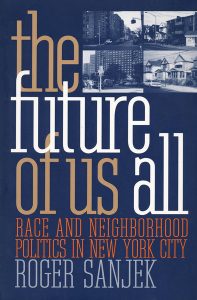
The future of Us All, by Roger Sanjek. 1998, Cornell University Press
Roger Sanjek was named winner of the 2002 J. I. Staley Prize for his book, The Future of Us All: Race and Neighborhood Politics in New York City (Cornell University Press, 1998). SAR President Richard M. Leventhal presented the $10,000 award to the author at a special ceremony on November 22 during the annual meeting of the American Anthropological Association.
In The Future of Us All, Sanjek chronicles the Elmhurst-Corona neighborhood in Queens, New York, over a thirteen-year period in which social relations changed dramatically. Between 1960 and 1990, the white population of the neighborhood dropped from 98 percent to 18 percent, as immigrants and African American newcomers arrived in great numbers. By 1992, New York’s Department of City Planning called Elmhurst-Corona “perhaps the most ethnically mixed community in the world,” with over forty different ethnic groups and nationalities represented in its population of 137,000.
“My primary concern as a writer was to make this book readable to the people in Queens, the people the book is about,” commented Sanjek. “I’ve had very strong and positive response from them. I’m also gratified that peers in my profession are recognizing the book as a significant and important book. Because the Staley prize represents a judgment from all four fields of anthropology, it’s especially meaningful. I’m in august company,” he added.
Sanjek’s study, conducted with a multi-ethnic team of fifteen researchers, lasted from 1983 to 1996. While the study focused primarily on district-level politics and social relations, a secondary level tracked the changing position and perceptions of the older white population as the diversity of their neighborhood became increasingly more complex. What began as an ethnography of one neighborhood’s majority-minority transition, writes Sanjek, “became a study of the roots, and weeds, of democracy.”
One of the book’s nominators hailed the work as a practical vision for “the transformation of the nation into a true multi-ethnic, rather than white-dominated, democracy.” Of all the human sciences, the nominator continued, “cultural anthropology has eminent authority to address, explain, and even forecast such changes. Sanjek’s volume boldly and publicly claims this ground for our field, with extraordinary brilliance, true anthropological craftsmanship, and great intellectual courage.”
The Future of Us All is one of forty-one books reviewed by a five-member panel comprised of Susan D. Gillespie, University of Florida; Gary H. Gossen, Deep Springs College; George R. Milner, Pennsylvania State University; Yolanda T. Moses, American Association for Higher Education; and Bonnie Urciuoli, Hamilton College. After convening twice, the panel submitted its recommendation to SAR’s Board of Managers, which granted the award.
Roger Sanjek, Professor of Anthropology, Queens College, City University of New York
2001 Staley Prize Winner: Keith Basso, Wisdom Sits in Places
Wisdom Sits in Places: Landscape and Language Among the Western Apache
by Keith Basso
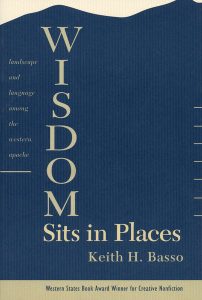
Wisdom Sits in Places: Landscape and Language Among the Western Apache, by Keith Basso. 1996, University of New Mexico Press
Keith H. Basso was named winner of the 2001 J. I. Staley Prize for his book Wisdom Sits in Places: Landscape and Language Among the Western Apache (University of New Mexico Press, 1996). Douglas W. Schwartz, then president of the School for Advanced Research, presented the $10,000 award to Dr. Basso at a special ceremony on August 7, 2001, at the School’s campus in Santa Fe, New Mexico.
In Wisdom Sits in Places, Basso explores how the Western Apache of the greater Cibecue region use the names of geographic places to carry multiple layers of meaning and information. Dr. Basso had worked with the White Mountain Apaches for over twenty years before Ronnie Lupe, one of the tribal leaders, suggested he turn his attention to Apache geography and map-making. “It is worth noting that Wisdom’s success is based on a uniquely long-lived and honorable relationship between a fascinating Native American community and a dedicated anthropologist,” observed Lupe, one of the book’s nominators.
The book is organized as four elegant and lyrical essays, each centered on a different Apache storyteller and the place-names he or she summons. “Widows Pause for Breath”, “She Carries Her Brother On Her Back”, and “Water Lies With Mud In An Open Container” are examples of Apache place-names that offer information not only about the geographic characteristics of a certain place or actual events that happened there, but also about morality, values, and wisdom that guide daily living. Vine Deloria, in a review for the Journal of the West, said, “Basso illustrates the idea that language and linguistics are mutually supportive and irretrievably combined so that knowing language connects an individual to the land and knowing the land holds the personality together in a cohesive, balanced unity.”
Basso illustrates how, among the Western Apache, “knowledge of places is closely linked to knowledge of the self, to grasping one’s position in the larger scheme of things, including one’s own community, and to securing a confident sense of who one is as a person,” wrote reviewer Cornel Pewewardy, for the Multicultural Review.
Wisdom Sits in Places is one of 37 books reviewed by a five-member panel comprised of Lane Beck, Arizona State Museum and University of Arizona; Regina Bendix, University of Pennsylvania; Kent Lightfoot, University of California, Berkeley; Tom Weisner, University of California, Los Angeles; and Ana Celia Zentella, Hunter College, City University of New York and CUNY Graduate School. After convening twice, the panel submitted its recommendation to SAR’s Board of Managers, which granted the award.
Keith H. Basso, Professor of Anthropology, University of New Mexico
2000 Staley Prize Winner: Nancy Scheper-Hughes, Death Without Weeping
Death Without Weeping: The Violence of Everyday Life in Brazil
by Nancy Scheper-Hughes
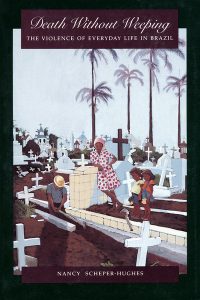
Death Without Weeping, by Nancy Scheper-Hughes. 1992,University of California Pres
Nancy Scheper-Hughes was named winner of the 2000 J. I. Staley Prize for her book, Death Without Weeping: The Violence of Everyday Life in Brazil (University of California Press, 1992). Douglas W. Schwartz, president of the School for Advanced Research (SAR), presented the award to Dr. Scheper-Hughes during a special ceremony at the American Anthropological Association meetings in San Francisco on November 17, 2000.
A medical anthropologist, Scheper-Hughes followed the narrative threads of infant mortality and the medicalization of social trauma to create a sweeping ethnography of poverty-stricken Northeastern Brazil. She studied the everyday life of sugar mill shantytown Bom Jesus da Mata for more than twenty-five years. At the core of Death Without Weeping are questions about the experiences of motherhood, malnourishment, and morality that revolve around the practice of what Scheper-Hughes has termed “selective neglect.” Some mothers in Bom Jesus withhold food and nurture from infants that display sickly qualities, using the scarce supplies to feed healthy babies instead, in a desperate attempt to save at least some of their children from starvation.
Susanna B. Hecht of the New Left Review summarizes Death Without Weeping, “In this world of hardship, Scheper-Hughes through superb writing, sensitivity, and heart illuminates the tactics of social navigation, resignation, and accommodation that circumscribe the lives of these women, their transient men, and their children.” Nominator Phillipe Bourgois stated that Death Without Weeping “is right where anthropology needs to be at the dawn of the new millennium. Its most powerful dimension is the intellectual as well as emotional evocation and analysis of the violence of hunger.”
Death Without Weeping is one of 41 books reviewed by a five-member panel comprised of Frank Korom, Boston University; Thomas L. Leatherman, University of South Carolina; Kirin Narayan, University of Wisconsin-Madison; Michael E. Smith, University at Albany-State University of New York; and Kathryn Woolard, Center for Advanced Study in the Behavioral Sciences, Stanford, California. The panel convened twice—once in December 1999 at the AAA meetings, and again in February 2000 at SAR. Selecting Death Without Weeping as their top choice, the panel submitted its recommendation to SAR’s Board of Managers, which granted the award.
Nancy Scheper-Hughes, Professor of Anthropology, University of California, Berkely
1999 Staley Prize Winner: Dorinne K. Kondo, Crafting Selves
Crafting Selves: Power, Gender, and Discourses of Identity in a Japanese Workplace
by Dorinne K. Kondo
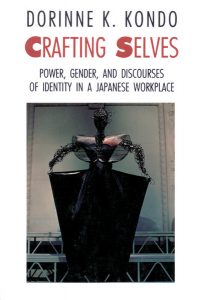
Crafting Selves, by Dorinne K. Kondo. 1990, University of Chicago Press
Dorinne K. Kondo was named winner of the 1999 J. I. Staley Prize for her book, Crafting Selves: Power, Gender, and Discourses of Identity in a Japanese Workplace (University of Chicago Press, 1990). The announcement was made by Douglas W. Schwartz, president of the School for Advanced Research (SAR), who presented the $7,500 cash prize to Dr. Kondo during a special ceremony hosted by SAR during the American Anthropological Association meetings.
Crafting Selves is a vivid account of everyday life on the shop floor of a small family-owned confectionery factory in Tokyo. As Dr. Schwartz points out, “much of our perception of Japanese work life is drawn from discussions of male middle class managers in large corporations, which portray a society of harmony, homogeneity, and lifetime employment.” Kondo’s work, he notes, shatters this notion by focusing on a small factory, where she also worked.
In presenting this work to the SAR’s Board of Managers for approval, Schwartz described the book as “a wonderfully readable account with exuberant detail, unraveling how people live and change in a fluid, complicated world.” It is also, he notes, “an examination of how the Japanese self is created, which reflects on the larger question of human selfhood.” In short, Crafting Selves is a “concise, readable, enjoyable, and insightful book, which is destined to become a classic.”
Crafting Selves was nominated for the J. I. Staley Prize by Steven Feld, who describes this study as “the one ethnographic book that I’ve read in the last year that really shook me up and made me feel that new kinds of theory, ethnography and writing really have a kind of future I hadn’t considered.”
Crafting Selves is one of 50 books reviewed by a five-member panel comprised of William Beeman, Brown University; Michael Herzfeld, Harvard University; Irma McClaurin, University of Florida; Karen Rosenberg, University of Delaware; and Dean Snow, Pennsylvania State University. The panel convened twice–once in December 1998 at the AAA meetings and again in February 1999 at SAR. Selecting Crafting Selves as their top choice, the panel submitted its recommendation to SAR’s Board of Managers, which granted the award.
Dorinne K. Kondo, Professor of Anthropology, University of Southern California
1998 Staley Prize Winner: Patrick V. Kirch and Marshall Sahlins, Anahulu
Anahulu: The Anthropology of History in the Kingdom of Hawaii
by by Patrick V. Kirch and Marshall Sahlins (two volumes)
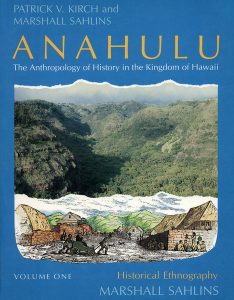
Anahulu, by Patrick V. Kirch and Marshall Sahlins. 1992, University of Chicago Press
Patrick V. Kirch, Professor of Anthropology, University of California, Berkeley
Marshall Sahlins, Charles F. Grey Distinguished Service Professor in the Department of Anthropology, University of Chicago
1997 Staley Prize Winner: Margaret Lock, Encounters with Aging
Encounters with Aging: Mythologies of Menopause in Japan and North America
by Margaret Lock
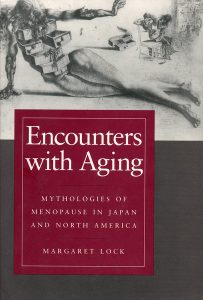
Encounters with Aging, by Margaret Lock. 1993, University of California Press
Margaret Lock, Professor of Anthropology, McGill University
1995 Staley Prize Winner: J. Stephen Lansing, Priests and Programmers
Priests and Programmers: Technologies of Power in the Engineered Landscape of Bali
by J. Stephen Lansing
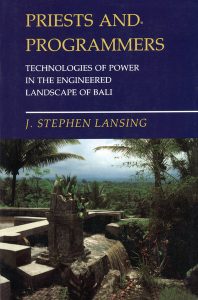
Priests and Programmers, by J. Stephen Lansing. 1991, Princeton University Press
J. Stephen Lansing, University of Southern California
1994 Staley Prize Winner: Michael Herzfeld, Anthropology Through the Looking-Glass
Anthropology Through the Looking-Glass: Critical Ethnography in the Margins of Europe
by Michael Herzfeld
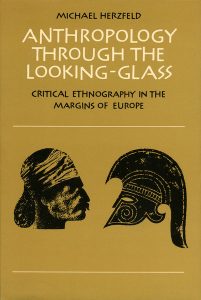
Anthropology Through the Looking-Glass, by Michael Herzfeld. 1987, Cambridge University Press
Michael Herzfeld, Professor, Department of Anthropology, Harvard University
1993 Staley Prize Winner: Richard Price, Alabi's World
Alabi’s World
by Richard Price
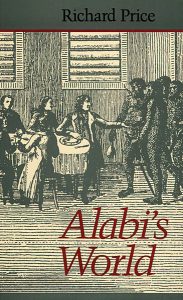
Alabi’s World, by Richard Price. 1990, Johns Hopkins University Press
Richard Price, Professor, Department of Anthropology, College of William and Mary
1991 Staley Prize Winner: Steven Feld, Sound and Sentiment
Sound and Sentiment: Birds, Weeping, Poetics, and Song in Kaluli Expression
by Steven Feld
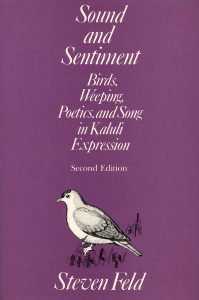
Sound and Sentiment, by Steven Feld. 1982, University of Pennsylvania Press
Steven Feld, Professor, Department of Anthropology, New York University
1990 Staley Prize Winner: Caroline Humphrey, Karl Marx Collective
Karl Marx Collective: Economy, Society and Religion in a Siberian Collective Farm
by Caroline Humphrey
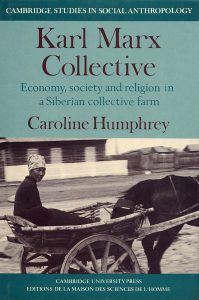
Karl Marx Collective, by Caroline Humphrey. 1983, Cambridge University Press
Caroline Humphrey, Lecturer in social anthropology, Fellow of King’s College, University of Cambridge.
1989 Staley Prize Winner: Robert Boyd and Peter J. Richerson, Culture and the Evolutionary Process
Culture and the Evolutionary Process
by Robert Boyd and Peter J. Richerson
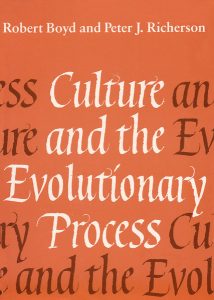
Culture and the Evolutionary Process, by Robert Boyd and Peter J. Richerson. 1985, University of Chicago Press
Robert Boyd, Professor, Department of Anthropology, University of California at Los Angeles
Peter J. Richerson, Professor, Division of Environmental Sciences, University of California at Davis
1988 Staley Prize Winner: Eric R. Wolf, Europe and the People Without History
Europe and the People Without History
by Eric R. Wolf
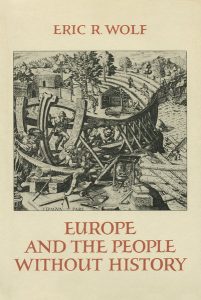
Europe and the People Without History, by Eric R. Wolf. 198, University of California Press
Eric R. Wolf, Professor Emeritus, Department of Anthropology, Herbert H. Lehman College of the City University of New York
